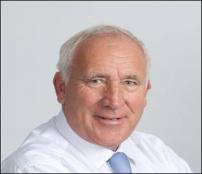Every day, we see the positive impact fostering can have on the lives, families and relationships of those who choose to foster.
And, for those considering becoming involved in fostering, we think there’s no better way to learn more about the ins and outs of foster caring than hearing from foster carers themselves.
Someone with such experience is Sir John Timpson, British businessman and owner of shoe repair chain, Timpson. John and his late wife Alex began fostering children in 1978, and together helped take care of over 90 young people of different ages.
Not only that, but John and Alex’s work in highlighting attachment disorder in looked-after children has helped other foster carers better understand the condition, and develop strategies to help them provide effective and practical support to children.
Recently, we were fortunate enough to speak with John about fostering and its impact, as well as his work in helping to raise awareness of attachment disorder in looked-after children.

Thank you very much for agreeing to talk to us. Firstly, could you tell us a little about how you first got involved in foster care?
In 1978, when my late wife Alex persuaded me to agree that we should apply to become foster carers, I didn’t realise how much this new direction would change our lives. Alex was a qualified nursery nurse. She worked as a nanny before we got married and she simply adored looking after children. Soon after we first met she told me, ‘I’ve always liked children, they’re far less complicated than grown-ups’.
After several sessions with social workers, and a panel meeting, we were approved as short-term foster carers. Five months later, the first foster children arrived at our house, brothers aged four years and three years.
You once said that fostering children has been the most rewarding job you’ve ever had. What aspects of foster care would you say are the most rewarding, and what have you enjoyed the most about caring for children over the years?
Our life and perspective on fostering changed when Alex, my late wife, went to a local foster care meeting where Dan Hughes, clinical psychologist, was the speaker. He introduced us to John Bowlby’s ‘Attachment Theory’, and we suddenly discovered ways of explaining some behaviours.
Learning new techniques and gaining a better understanding of how to take care of every individual child, regardless of their circumstances, was definitely one of the most rewarding aspects of fostering for us.
Having taken care of 90 looked-after children, you must have faced some incredible challenges over the years. What would you say is the biggest challenge you’ve faced, and what steps did you take to overcome it?
My Wife and I approached all our challenges by providing a loving, caring environment where children are able to heal and feel secure. Their challenges are all individual, but using that starting point really helped us.
You’ve written extensively about fostering, including a practical guide for fellow carers about attachment disorder. Could you tell us a little about your experience of attachment disorder, and why you thought it was an important subject to cover in a book?
Foster carers and adoptive parents face similar problems and most have not heard about ‘attachment’. In 2010, I discovered the charity After Adoption was developing a support programme called SafeBase to help adoptive families cope with challenging children.
Alex and I met some of the couples who had attended the early courses; they were emotionally grateful for the support and advice, some claiming, ‘it was a light bulb moment’ and ‘at last we can get our family back together’.
Over the last five years, we at Timpson have helped SafeBase develop from a pilot project to become a service now available through over 70 local authorities.
To spread the word, I wrote an easy-to-read ‘Guide to Attachment’ – over 150,000 free copies have already been distributed.
You have previously stated a desire to help encourage schools to better understand how to take care of looked-after children. In your opinion, what more should schools be doing to make the classroom more inclusive for looked-after children?
Teachers that understand how to motivate children with challenging behaviours usually find they become a mentor as well as a teacher. Through respect and trust, they start to establish a bond that gives confidence and self-belief.
This successful, one-to-one approach also helps all pupils in the school, not just looked-after pupils. Attachment-aware schools develop a culture in which the individual child is more important than the overall process prescribed by the education authorities.
Teachers are allowed to use their initiative and perform the role for which they joined the profession. This slightly maverick approach is a feature of those schools that nurture their whole community

What would you say you’ve learnt through your time as a foster carer? Do you think it changed you as a person or affected your outlook on life?
My experience as a foster carer, a school governor and being part of a business that successfully employs people from prison has shown me the benefits that are created by a kind and caring organisation that understands the significance of attachment, and the need to create an environment of safety, understanding and trust.
Do you think enough is currently being done to promote foster care in the UK?
Foster care will always evolve as times and society change, and communities must always be mindful of the importance of a safe and secure family environment for those very vulnerable children and young people who are placed in foster care.
What advice would you give to someone thinking of becoming a foster carer?
Learn what fostering is really about, speak to the professionals that guide you, and try to really understand the problems associated with attachment disorder; it will help enormously in giving your child the type of care they really need.
We’d like to thank John for sharing his views on fostering, and hope that his experience and advice can help you on your own fostering journey. If you’re ready to take your first step towards becoming an NFA foster carer, call our team today on 0330 022 9135 or visit our homepage for more information.